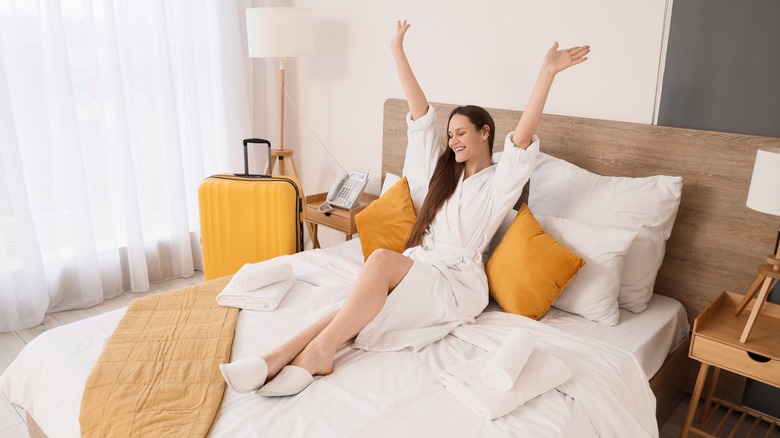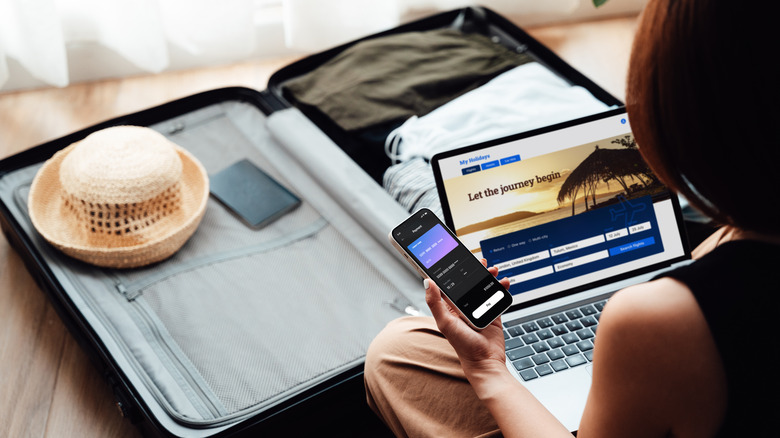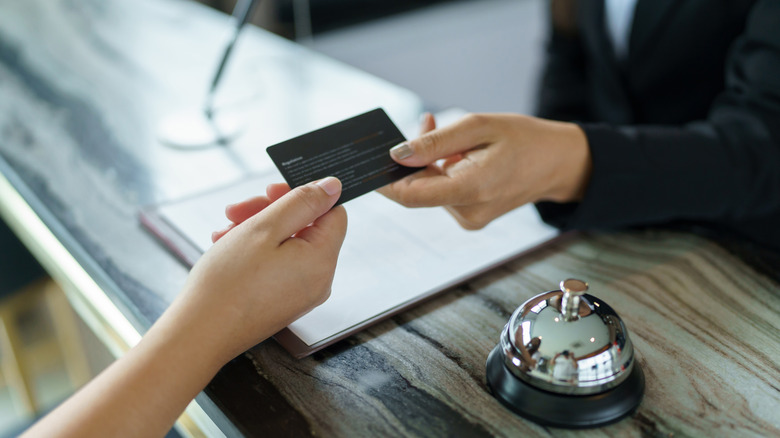Make Your Hotel Stay More Affordable With These Simple Hacks And Perks
So, you've ironed out your days off work and are excited about spending time away from the usual grind with a well-deserved vacation. Now, you're confronted with another challenge: sorting out your holiday's accommodation. Which, to your dismay, can cost quite a pretty penny. Fortunately, there's a lot you can do to curtail some of these expenses — from the best ways to find cheap last-minute flights to pinning down the best destinations where the U.S. dollar goes furthest.
Hotel accommodations take up a significant chunk of your vacation budget, and that's not changing for the better anytime soon. According to a 2025 HRS Market Insights Report, average daily rates (ADR) for hotels have risen this year, making it more important than ever to figure out how to make hotel stays more affordable.
As it turns out, there are a number of tactics that you can use to get more bang for your buck when navigating hotel bookings. Savvy travelers have figured out that using different booking platforms, maximizing loyalty programs, and even appealing to the good graces of hotel staff are all useful strategies that can lower hotel rates and offer you extra perks. And who could say no to that?
Asking and negotiating nicely goes a long way
Haggling isn't confined to souks in Morocco or the night markets of Thailand. Surprisingly, asking or negotiating for a lower hotel room price isn't as farfetched an idea as you would think. Remember, hotels want your business. And, considering that hotel occupancy rates are usually between 60% to 70%, filling in the remaining rooms would be in their interest.
That said, calling the hotel ahead of time and speaking with a hotel manager directly — you can't haggle with the bots at the hotel's reservation hotline — can help score you a lower rate than what's advertised online. Just remember to stay cool and polite, but persistent. You'd be surprised at what phrases like "Is that the best you can offer?" or "That's more than I can spend," can get you.
Not the best haggler? Try asking instead. Don't be shy about politely requesting for a room upgrade upon check-in. Hotels know that upgrading guests gains loyalty and repeat bookings in the long run — especially for frequent travelers. Mention a special occasion such as a birthday or anniversary if this is the case. At best, you could end up with a complimentary room upgrade or additional perks like a cake or a bottle of bubbly. If you do get an upgrade, show your appreciation by posting a good review or dedicating an Instagram story to your stay. Just make sure to tag them, too, so they'll remember you should you return to their establishment.
Choose your check-in dates wisely
If your dates are flexible, you'll find that prices during the middle of the week can be cheaper than Fridays and the weekends. Just as midweek bookings can efficiently save you money on flights, timing your stays during the work week can be a cost-effective strategy when booking hotels. If you're traveling overseas, booking on Thursdays can save you up to 6% of the room rate, according to Skyscanner. Meanwhile, Kayak suggests that Mondays offer even lower rates, fetching you savings of around 10%. If you have to travel on a weekend, Kayak also suggests checking in on Sunday to catch the tail-end of weekenders and beat the wave of business travelers arriving on a Monday.
Timing is everything, especially for beating the holiday hotel traffic. Off-season bookings generally fetch lower prices, and, according to Kayak, November is the sweet spot to take advantage of a significant dip in hotel room rates. In fact, domestic hotel rates in November are 20% lower than in June; and, internationally, you can potentially save up to a staggering 31% compared to summer. Plus, traveling during these quieter times also means you'll be more likely to receive an upgrade, since there won't be as many people competing for the attention.
Sign up for loyalty programs and use credit card points
Another great way to save is to redeem your credit card points for hotel stays instead of airfare. Specifically, experts and travelers agree that using those points on hotels yields more returns in perks and savings in the long run, whether it's a free airport shuttle, a complimentary spa session, or a free night. Not only that, but it also gives you more control over how you want to spend your points — whether that's choosing a better location or treating yourself to extra amenities you wouldn't otherwise get.
Signing up for loyalty programs for future travels can grant you access to better rooms, rates, and hotel perks such as late check outs or welcome gifts — and who wouldn't want that? Even if you aren't a frequent traveler, joining a hotel's loyalty program instantly gets you discounted member rates.
Additionally, many loyalty programs often provide instant status upgrades simply for holding certain credit cards, regardless of whether you use those cards for bookings or not. That said, it's worth reviewing all of your credit card benefits before your trip, as you may already have hotel perks and elevated status that you're not even aware of.
Double-check hotel rates on your mobile phone and laptop
Can the tech you use to book your hotel stay can actually make a big difference in savings? As it turns out, hotel prices can differ between a mobile booking app and a desktop. This is primarily due to the fact that websites require added expenses — such as Google ads, customer acquisition costs, and keyword bids. Upon testing both app and phone browser platforms, a study by consumer website Which? revealed that OTAs didn't always deliver on cheaper mobile app prices rather on a phone browser as promised. The only exception was Booking.com, whose mobile app consistently delivered lower-priced hotel rates compared to its website. According to the same study, however, these mobile-only prices are only visible when using a phone. Which means that travelers who browse on laptops, tablets, or even desktops remain unaware of these deals — potentially causing less tech-savvy customers to miss out on savings.
Beyond that, here's also the issue of different online travel agencies (OTAs) catering to their regional market strengths. So, while platforms like Agoda offer bigger hotel discounts in Asia, Europe, and the Middle East, Priceline offers significantly lower hotel rates in the U.S.
The moral of the story? Always double-check hotel prices on a mobile app, mobile browser, and desktop to get the best rate possible. Certain OTAs can be misleading with their mobile offers, revealing cheaper hotel rates via computer browsers when cross-checked. And on that note ...
Go directly to the source and book on the hotel's website
Booking directly through a hotel's website not only guarantees the best possible rates, but also opens the door to many additional benefits and complimentary services. If you do find lower rates on booking engines, it's worth the effort of calling the hotel to ask them to match the price, or even offer a bigger discount.
As a revenue/reservations manager for three resorts shares on Reddit: "Not all hotels allow their rates to be undergouged by OTAs, it really leans on the revenue managers to keep that monitored if they want to maintain parity and not lose a bunch of direct business to OTA [...] I monitor them daily to make sure nothing funky is happening and if a guest calls in to say they see a better rate online they usually have the wrong date loaded. If you call my team directly and reference you saw us on a third party we also offer a 10% discount to try and secure the direct business."
And, in the unfortunate event of having your flight delayed or canceled, rebooking your stay directly with the hotel will be much easier than going through a third-party booking platform's customer service. There's no greater frustration than being subjected to annoying muzak as you're put on hold for 30 minutes waiting for an agent to answer your call.





